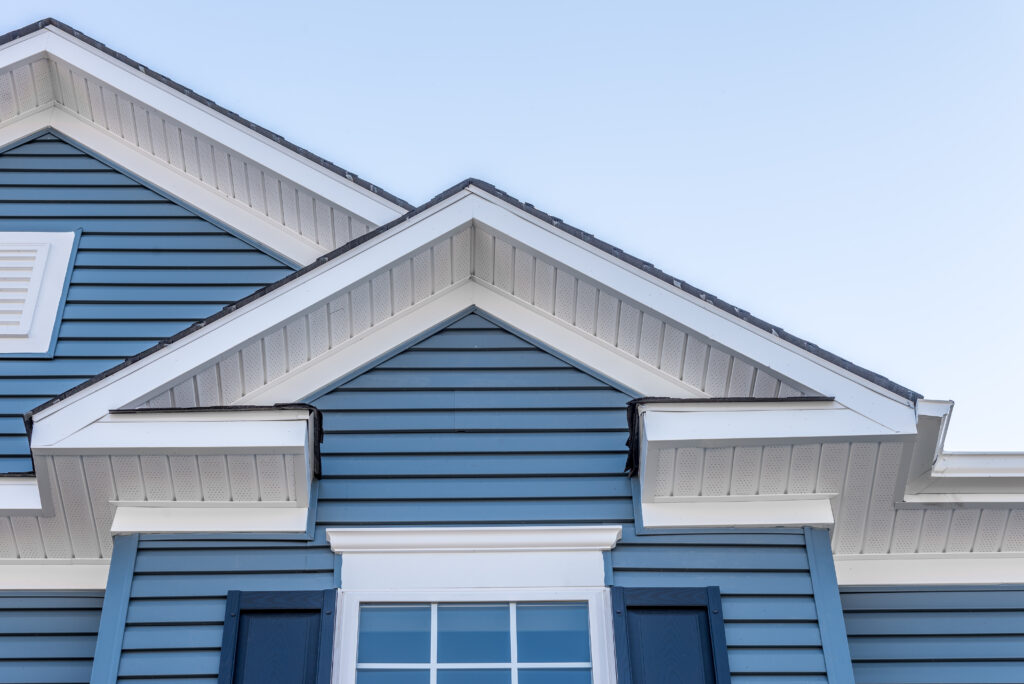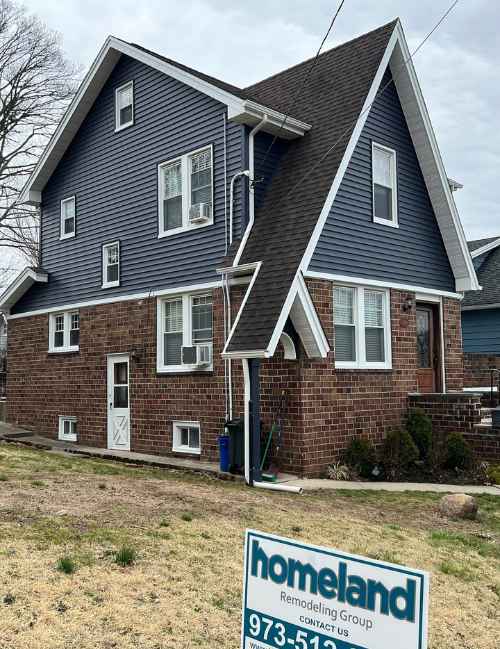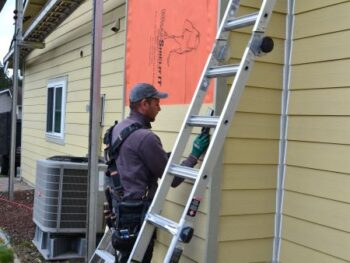Top-Rated Morris Siding Contractor Offering Expert Installation Services
Top-Rated Morris Siding Contractor Offering Expert Installation Services
Blog Article
The Crucial Guide to the Numerous Types of House Siding and Their Unique Benefits
In the world of home enhancement, picking the ideal house siding is an essential decision that influences both visual appeal and functional performance. With so several alternatives to think about, which house siding product really stands out for your particular project?
Wood Exterior Siding
Wood siding, a popular selection for household outsides, supplies an ageless aesthetic that combines all-natural charm with architectural stability. This home siding product is offered in various designs, including clapboard, shingles, and board-and-batten, permitting house owners to customize their façade to match their layout preferences. Timber house siding is typically crafted from sturdy types such as cedar, redwood, or pine, which are recognized for their strength and capability to withstand ecological stressors.
One of the primary advantages of wood house siding is its exceptional insulation residential properties, which can add to power efficiency and reduced heating expenses. In addition, wood house siding is naturally degradable, making it an eco-friendly choice when sourced sustainably. Regular maintenance, consisting of painting or staining, can lengthen its lifespan and improve its look, allowing house owners to preserve the natural appeal of the timber.
Nevertheless, possible drawbacks include sensitivity to pests, rot, and weather condition damages, necessitating appropriate therapy and maintenance - morris siding contractor. In spite of these problems, when correctly looked after, wood exterior siding can give a long lasting and gorgeous option that enhances the character of a home while supplying a warm, welcoming atmosphere

Plastic Home Siding
Vinyl house siding has actually emerged as a leading selection for house owners seeking a low-maintenance outside choice that incorporates toughness and cost. This functional product is crafted from polyvinyl chloride (PVC), making it resistant to different climate condition, including wetness and UV rays. As an outcome, vinyl siding does not warp, rot, or discolor, making sure durable aesthetic appeal.
Among the primary advantages of vinyl exterior siding is its considerable variety of shades and styles, allowing property owners to attain the desired search for their residential or commercial property without the demand for frequent repainting. Additionally, plastic house siding is easy to set up, which can dramatically reduce labor expenses throughout building and construction or remodelling jobs.
Plastic house siding also adds to power performance. Many options function insulation support, which boosts thermal efficiency, helping to preserve comfy interior temperatures and possibly decreasing power bills. Additionally, its smooth surface assists in simple cleansing, calling for just regular cleaning with a yard pipe to eliminate dust and debris.
Fiber Concrete Home Siding
Fiber concrete home siding has gotten traction amongst house owners and builders alike due to its remarkable mix of durability and visual versatility. Made up of a combination of cellulose, cement, and sand fibers, this exterior siding choice is crafted to withstand extreme weather conditions, consisting of high winds, heavy rain, and temperature level variations, making a fantastic read it a look at here durable selection for household outsides.

One of the key advantages of fiber concrete house siding is its resistance to pests, such as termites, and its non-combustible nature, offering improved fire security. morris siding contractor. In addition, it is offered in a vast range of styles, shades, and appearances, allowing house owners to attain their desired aesthetic without giving up performance
Another benefit is its reduced upkeep requirements; fiber cement house siding generally needs paint or discoloration every 5-10 years, which is less regular than various other products. Its durability adds to a reduced total price of ownership, as it lowers the need for frequent repairs or replacements.
Eventually, fiber concrete siding represents an exceptional financial investment for those looking for a resistant, eye-catching, and versatile outside choice, integrating both type and function to boost the home's visual charm.
Metal Exterior Siding
The appeal of metal siding hinges on its robust toughness and contemporary aesthetic appeal, making it a favored option for modern design. Offered in materials such as aluminum and steel, steel house siding provides a series of shades and surfaces, permitting home owners to attain an individualized look that complements their layout vision.

Power performance is an additional considerable benefit, as lots of steel home siding items are created with insulation choices why not try this out that help control indoor temperatures. This can lead to reduced energy costs in time. Furthermore, metal exterior siding is usually recyclable, making it an eco pleasant choice for sustainability-minded property owners.
The installment procedure for metal exterior siding can be relatively straightforward, resulting in a quicker turnaround time for construction tasks. On the whole, steel exterior siding integrates functionality and style, making it a functional choice for those seeking a long-lasting and aesthetically appealing outside finish.
Block and Rock Exterior Siding
Block and rock home siding attracts attention as an ageless choice that boosts the aesthetic charm of any type of home. Understood for their sturdiness and low upkeep, these materials give an exceptional roi while raising the home's curb charm. Available in different colors, structures, and patterns, brick and stone can be customized to suit varied architectural styles, from traditional to contemporary.
Among the key advantages of brick and rock siding is their energy performance. Both materials possess natural shielding residential properties that help control interior temperature levels, potentially minimizing cooling and heating costs. Furthermore, they offer superior fire resistance contrasted to other siding choices, adding to boosted safety and security.
Another benefit is their long life. Brick and rock can last for years, often requiring minimal upkeep beyond periodic cleaning. Unlike wood home siding, they are unsusceptible parasites and rot, making certain a long-lasting exterior that withstands the elements.
Conclusion
In summary, the option of siding significantly impacts a home's aesthetic allure, power efficiency, and upkeep needs. Each sort of house siding-- whether timber, vinyl, fiber block, concrete, or metal and rock-- offers one-of-a-kind advantages customized to different house owner preferences and environmental conditions. Understanding these alternatives allows notified decisions that boost both the durability and visual charm of household outsides. Ultimately, choosing the ideal home siding is necessary for accomplishing an equilibrium in between functionality and layout in property architecture.
One of the main advantages of timber house siding is its superb insulation residential properties, which can contribute to power performance and reduced heating prices. In addition, wood siding is eco-friendly, making it an ecologically pleasant choice when sourced sustainably.One of the primary benefits of metal siding is its resistance to different environmental factors.Power efficiency is an additional considerable benefit, as lots of steel home siding items are designed with insulation options that help regulate indoor temperature levels. Each type of home siding-- whether timber, plastic, fiber steel, cement, or block and rock-- supplies distinct benefits tailored to various house owner preferences and environmental problems.
Report this page